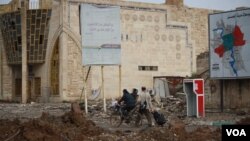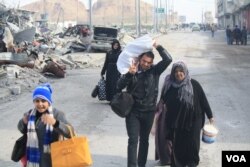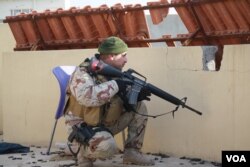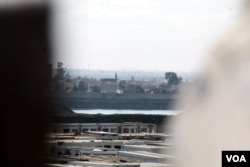"I could barely hear my sister-in-law at all," said Qaiser, 17, at a refugee camp about 30 kilometers from Mosul, Iraq. "She was hiding behind the toilet, speaking as quietly as she could."
The woman's hushed, hurried tone and the mortars, gunfire and airstrikes outside her western Mosul home on Thursday made her phone call difficult to hear. "But I heard one thing," Qaiser said. "She told me, 'They have taken your brother.' "
This phone call was the first made in the 30 days since Qaiser's family had fled the Islamic State-controlled part of Mosul.
Like many other calls coming from scared residents, it revealed a world beyond the front lines that is rapidly descending into a living hell. Militants have become more brutal, turning trapped families into virtual prisoners. Bombs from both sides rain down while residents run out of food, fuel and water.
A month ago, as the Iraqi army was moving closer to Qaiser's area of Mosul, teenage militants told families they could run away from the battle without fear of retribution from IS. It was unusual mercy from a group that normally shoots at civilians running away.
Qaiser's brother, 22, and his wife had stayed behind to protect their family's home and possessions while his six siblings fled. Shortly after they left, IS militants came to the house and arrested the brother.
The sister-in-law didn't call sooner because she didn't want the family to carry the weight of what had happened: Their loved one is in prison because they are free.
Fear of phones
She also waited to call because IS militants have become increasingly strict in enforcing their rules in all things. And the most important rule at present, families say, is the ban on mobile phone calls, which can be punished by death.
"She didn't even want the neighbors to know she has a working cellphone," said Qaiser. "There are spies everywhere."
Militants are scared that residents are talking to Iraqi army soldiers on mobile phones, sharing information that will help coalition forces defeat the group.
"They recently arrested 40 people from around here for talking on phones," said Fawas, with his hands on the shoulders of his 5-year-old son in a neighborhood that was taking mortar fire only a few days ago. "They hung the bodies of the victims on the traffic lights."
And according to soldiers, militants are right to be scared of the people and their phones.
"I have people in western Mosul calling to tell me where IS is storing weapons or hiding out," said Captain Amr Abdulsada, at a base alongside the Tigris River. "We have the intelligence."
Price surge
Other terrified, hurried calls are sometimes made on rooftops because of bad reception, and sometimes in back rooms for fear of being caught.
Residents say problems inside their homes eclipse even the bombs and aerial bombardments. The prices of food and fuel have climbed, the water is bad and the people are out of money.
Some items, like eggs and sugar, cost as much as 30 times their normal price, if you can find them. Most families are reduced to one meal a day, and many say they have only potatoes and onions to eat, even at hefty costs. Many families now burn their furniture to cook and heat their homes, according to their relatives in areas controlled by the Iraqi armed forces.
And the longer the war goes on, the worse it gets, said Ahmed, 20, a former student in an area of eastern Mosul taken by Iraqi forces about two weeks ago.
"The other side is surrounded on all sides, so there's no way to sneak in anything," he said, after a late-night call with a friend. "The militants are under siege."
The people, however, are bearing the brunt of the pain, he added.
Many have been unemployed since the day IS took over Mosul in 2014, or have been working city service jobs, like teaching or fighting fires, without a salary for 2½ years. Families say people are already dying for lack of food, but whispered phone calls are not enough to create a clear picture of the depth of the crisis.
"A month ago, we could take a boat to the other side to bring help," said Thiaa, a day worker in Mosul. "Instead of coalition planes dropping bombs, why can't they drop food?"








